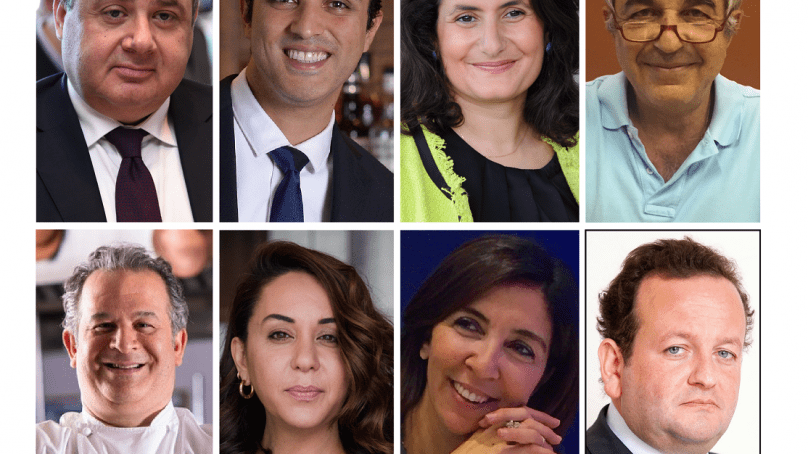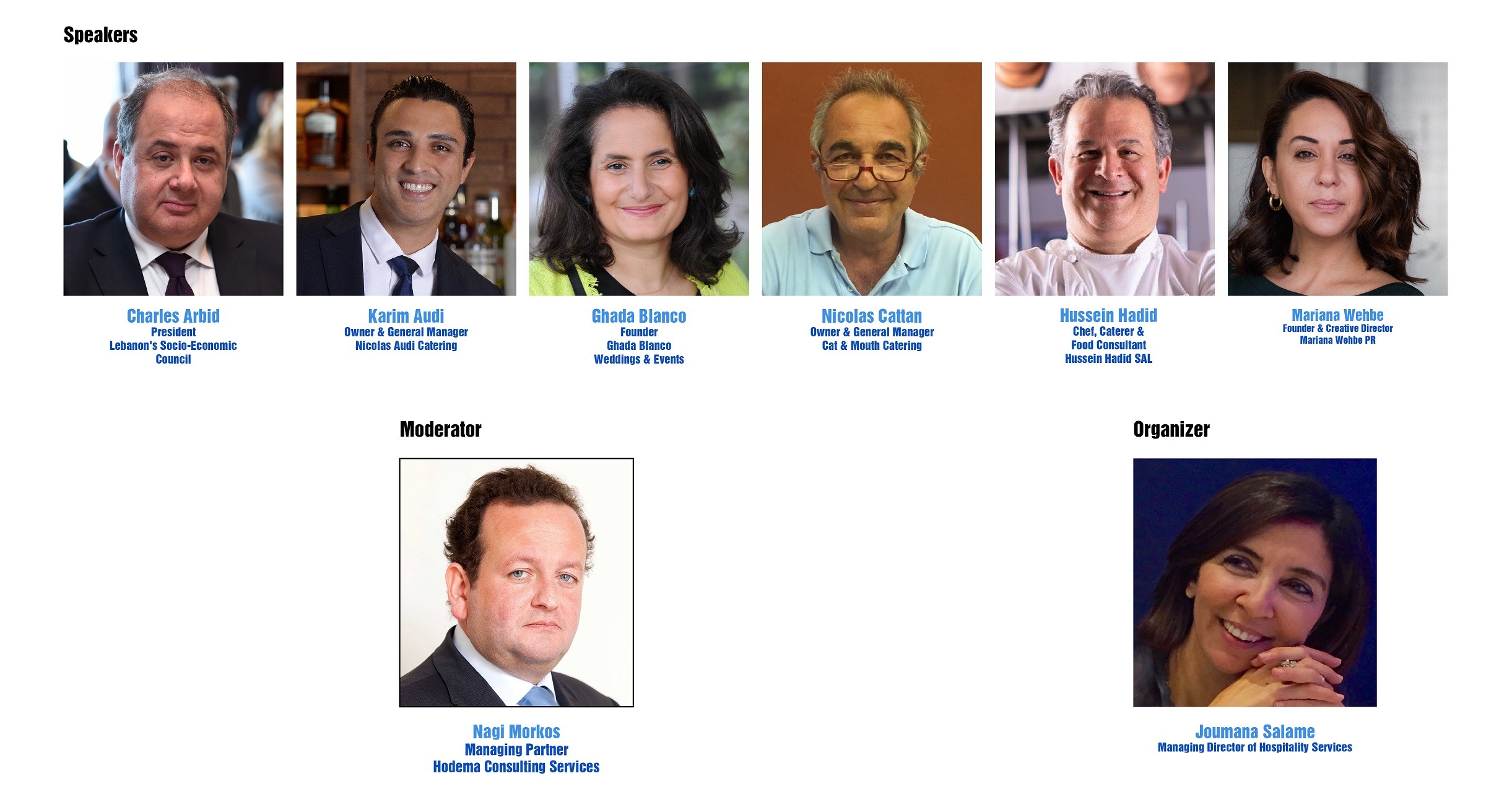Powered by Hospitality News Middle East and funded by the USAID Lebanon Enterprise development (LED) project, Hospitality News Talks held its fourth virtual roundtable on March 4 — “The catering and events industries in Lebanon: adapting to a new normal.” The online session, one of 12 such talks moderated by Hodema Consulting Services, invited a panel of industry professionals, including chefs, caterers and event planners, to discuss the challenges the sector has faced as a result of Covid-19, economic paralysis and other factors.
The panel included: Charles Arbid, president of Lebanon’s Socio-Economic Council; Karim Audi, owner and GM of Nicolas Audi Catering; Ghada Blanco, founder of Ghada Blanco Weddings & Events; Nicolas Cattan, owner and GM of Cat & Mouth Catering; Hussein Hadid, chef, caterer and food consultant; and Mariana Wehbe, founder and creative director of Mariana Wehbe PR. Nagi Morkos, managing partner of Hodema Consulting Services, moderated the session.
Arbid kicked off the discussion by reiterating the strength of Lebanon as a brand. “The Lebanese have always been known for their talent, creativity and professionalism. Our catering and events industries are well perceived by the outside world. Lebanon is a brand of great value.” Arbid went on to add that political instability has become endemic and the economic collapse of the country has had an enormous impact on the sector. “While Covid-19 will eventually disappear, we need to think about rebuilding confidence. Demand is a big challenge; we often have demand from outside and yet the political uncertainties in Lebanon create a massive barrier. On a local level, purchasing power has been slashed by up to 80 percent, so we are literally using trial and error in terms of our pricing.”
To combat the negative effects of Covid-19 on his business, Audi diversified his offering. “We realized that after a certain hour, we couldn’t order delivery, and this prompted us to create our own menu of tasty dishes and daily specials. We went back to the basics of catering to feed families of up to six people and scaled down the operation. Now it is a big part of our yearly revenue, and we are looking to export the concept.” Audi explained that while no one was laid off, tough decisions had to be made to keep the business afloat. He added that: “Lebanese living abroad will no doubt be more inclined to host their events here because it has become less expensive to do so. However, we have a dilemma in terms of pricing. We cannot price the same.”
“We had to scale down and work at a minimum. It was slightly easier as I don’t have a large workforce. We tweaked our menu and started producing more affordable dishes for the local market. It was all about adaptation and flexibility,” said Hadid. The chef and food consultant stressed the importance of using local products and finding alternatives to ingredients that are now very expensive or difficult to source. “We substituted imported brands for local ones to cut our costs. We did not compromise the quality, of course. There are often alternatives: using strawberries instead of raspberries, for instance. We need to develop an industry where we are self-sufficient. We can produce a lot in Lebanon.”
Wehbe, who is known for organizing high-end events, spoke about the role of technology. “Technology is extremely important, and we are so behind in Lebanon. It is the way to push forward our industry, share information and attract clients, especially abroad.” She added that while events may not be on the same scale as before, they can still be profitable. Clients will be looking for top-notch service and more for their money. She also highlighted the fundamentality of working collectively. “We can no longer think on our own. We have a duty and a responsibility to collaborate. There are so many brilliant, creative minds in Lebanon. If we ditch the competitive attitude we have toward one another and work together instead, we can actually bring more business to the country.”
Cattan was able to stay in business by cutting his expenses and pouring his energy into profitable activities. “The restaurant at Bouyouti is one part of our business that continues to do well. In addition, we focused on daily deliveries for small groups and looked for projects abroad. We have also been asking our clients to pay in cash during this tough period.” The renowned caterer was less optimistic about the likelihood of foreigners choosing to do their events in Lebanon once the coronavirus disappears. “There are so many benefits abroad. Even if it is less expensive now, I don’t know that they will come.”
Event organizer Blanco talked about the positives that make Lebanon appealing, especially to those planning their weddings. “We have beautiful locations, amazing weather; we are very professional and have great taste. The weddings we are seeing are not as big, but people are still looking for a certain quality that they can find in Lebanon because we have vast talent and creativity in the country.” Blanco emphasized that unity is crucial and a syndicate would be a good start to set guidelines and control the industry. “We should be discussing things together. Following the rules is paramount. At events, for instance, we should have PCRs at the door, masks, social distancing, etc. These standards need to be upheld for the good of all stakeholders.
The panel agreed that it is essential to work together and encourage one another. They said that a syndicate is important to set rules and clear guidelines, particularly in terms of pricing. By working collectively, caterers could also help each other in terms of staffing, which would also have a positive impact on the income of their employees.
Furthermore, they highlighted the significance of venturing into new markets. While traditionally visitors from the Gulf were big contributors to Lebanon’s tourism and events industries, countries in the Arab word are spending more money on upgrading their own sectors, evident in KSA, Kuwait and Qatar. This has thus led to a loss of competitive advantage for Lebanon. A bigger effort needs to be put into targeting the enormous Lebanese diaspora and travel-savvy Europeans. Now that Lebanon has more affordable for all foreigners, the opportunity is there.
It is clear that the catering industry needs to rely more heavily on homegrown ingredients to be sustainable and keep their prices down. This creates opportunity for local producers to create local alternatives to items that were previously imported, such as certain dairy items. The crisis has forced Lebanon to be more self-sufficient, and this trend will only continue.
Finally, digitization is a priority. Companies need to embrace the tech revolution and be active online. Social media is one of the most powerful tools in marketing, even more so in an age of Covid-19. For caterers and event planners to reach overseas audiences and entice them with customized catering or special packages in Lebanon, the need is even greater.















